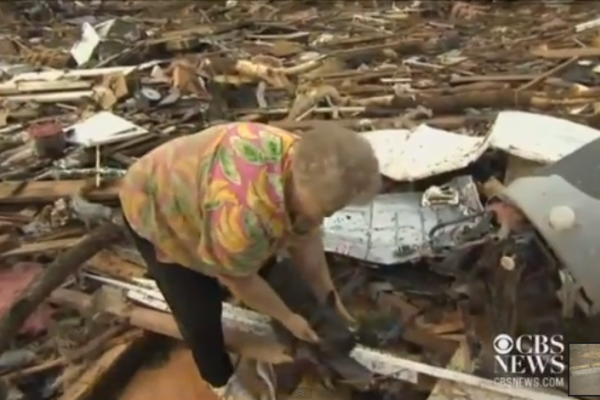After witnessing the profound impact of the Joplin, Mo., tornado last year from a nearby community, I became aware of an unexpected survival mechanism that became quickly woven through the fabric of the raw humanity exposed by the storm. Within a surprisingly short amount of time, Joplin residents began searching for God.
God was certainly visible through the handiwork of thousands of volunteers and countless displays of seemingly superhuman acts of courage and generosity, but there was a subtle strand of a collective consciousness that developed in the aftermath. Common stories about children witnessing “butterfly people” during the storm emerged and spread quickly. Counselors who were interviewed described hearing people repeat these viral stories with similar themes over and over again. Parents explained how they found the butterfly people stories capable of calming their hyper-vigilant children. The stories were exchanged between victims waiting in line for supplies and social workers involved in providing aid. An image of a butterfly even made it's way into a memorial mural painted on a downtown building.
At some point, probably very early on in the spread of these accounts, ownership and details were lost as the stories thrived and remained intact for the most part. It became impossible to attribute and verify the accounts from those who experienced them first-hand.
Why did the collective accounts emerge so quickly and spread at such a rapid pace? In the chaotic scenes depicted of Moore, Okla., last week, it was difficult to find God — but a video of the precious woman who claimed she prayed for her dog after he emerged from the rubble went viral on social media throughout the day. People will cling to these random moments when the divine is revealed in often peculiar ways. These moments will turn into stories that will comfort and contribute to the survival of a community that is finding strength it didn’t know it possessed.
Communities have probably always overcome unimaginable circumstances in this way. It may even be the phenomenon that propelled widespread circulation of many of the biblical accounts that were first narrated orally. They often illustrate an oppressed community that finds God in unexpected occurrences.
Ultimately, the acknowledgement of divine presence reinforces God’s concern for God's people. The name used to refer to Jesus in Isaiah and Matthew, Immanuel, means “God with us.” The prophesy in Isaiah assured King Ahaz of his protection from enemy kingdoms; and ultimately, Jesus became the fulfillment of God embodied in flesh and aching alongside humans who were struggling. Jesus was a revelation to humanity that God is indeed with us. According to Rob Bell in his recently published book, What We Talk About When We Talk About God:
“the peace we are offered is not a peace that is free from tragedy, illness, bankruptcy, divorce, depression, or heartache. It is peace rooted in the trust that the life Jesus gives us is deeper, wider, stronger, and more enduring than whatever our current circumstances are, because all we see is not all there is and the last word about us and our struggle has not yet been spoken.”
The collective anecdotes that originate out of a community’s shared painful experience provide evidence that individuals recognize they are not alone on an intuitive level. Survival moves to the forefront and those of all ages contribute to the formation of stories of the God who is with us.
There is no doubt small children too young to articulate their experiences witnessed “butterfly people” during the Joplin storm, but the facts and details became irrelevant to the story beneath the story that points to the recognition that God understands our pain and is somehow more present to those afflicted.
Rachel Lloyd is director of the Academic Success and Advising Center and the American Indian Center for Excellence at Northeastern Oklahoma A&M College. She holds a bachelor’s degree in psychology/global studies from Drury University and a master’s degree in psychology from Pittsburg State University. Rachel was a member of the executive planning team for her community's poverty task force and regularly advocates for minority and LGBT students. She is married and has a teenage daughter.
Got something to say about what you're reading? We value your feedback!
